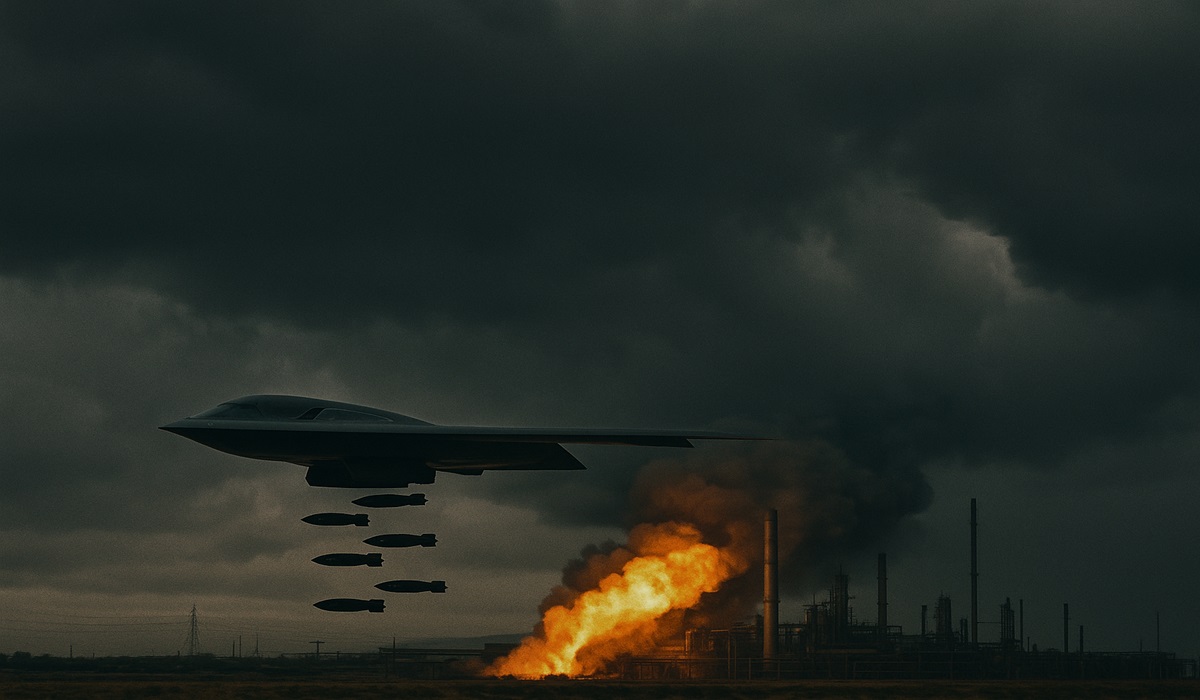TRUMP’S ACT OF WAR: U.S. BOMBS IRANIAN NUCLEAR FACILITIES, SHATTERING GLOBAL PEACE AND INVITING CHAOS
- TDS News
- Breaking News
- June 21, 2025

In an act that will haunt global diplomacy for decades, President Donald J. Trump authorized the bombing of Iranian nuclear facilities on June 21, 2025, with precision-guided B‑2 stealth bombers targeting Fordow, Natanz, and Isfahan. These are not secret weapon bunkers hidden in the desert—they are internationally inspected civilian nuclear sites. This brazen assault, cheered on by the Israeli government, is a violation of international law, Iranian sovereignty, and any remaining trust in American leadership.
This was not a defensive operation. It was a deliberate provocation. These weren’t rogue drones. These were high-tech, “bunker-busting” bombs designed to obliterate fortified sites—a direct message from the U.S. to the world: America drops bombs when it wants, where it wants, and the rules do not apply to it.
For three decades, the world has listened to Israel’s alarmist predictions about Iran’s nuclear ambitions. “They’re six months away,” “two days away,” “on the brink”—we’ve heard it all before. Yet in thirty years, Iran has launched no nuclear weapon, initiated no first-strike, and continued to comply with IAEA inspections despite crippling sanctions and threats. Meanwhile, Israel itself possesses an undeclared nuclear arsenal and has never allowed international inspections. This is not a fair fight—it’s a rigged narrative designed to justify perpetual war.
President Trump ran on promises to end foreign entanglements, yet has become the face of one of the most dangerous escalations in U.S. history. This wasn’t “America First.” This was “Israel First. America pays.” And pay we will.
It’s a sickness. An addiction. The American government is hardwired to drop bombs the way other nations hold peace talks. From Vietnam to Iraq to Afghanistan to Libya, the U.S. has never met a sovereign nation it couldn’t try to dismantle with shock and awe. The playbook doesn’t change. The victims always do.
Iran will respond. They must. Any nation that fails to respond to an unprovoked bombing would lose all regional credibility. And when they do, Israel will demand more. That’s the cycle. That’s Netanyahu’s game.
The Israeli government, having successfully lobbied the U.S. to use its bunker-busters on Iran’s nuclear sites, will not stop here. It never does. It’s always, “Now bomb their navy.” “Now intercept their missiles.” “Now refuel our jets.” “Now send Iron Dome.” America has become Israel’s military wing, and Netanyahu is holding the leash.
Let’s not sugar-coat it. Netanyahu has effectively captured U.S. foreign policy, turning every Israeli threat into an American military directive. And once again, America followed. The nuclear sites are bombed, the dust is still settling, and instead of restraint, Israel’s government is already calling for the next phase: strikes on Iran’s military infrastructure.
And Washington? It nods along.
The logic is infuriating: If the goal was to neutralize Iran’s nuclear capacity—as Israel demanded—then mission accomplished. There should be no further need for military action. No more air support. No more refueling operations. No more weapons shipments. Let Israel handle its own wars.
But that’s not how Netanyahu plays. He doesn’t want security—he wants dominance. He wants to drag Iran into a wider war and make sure the U.S. foots the bill.
Israel demanded the U.S. bomb Iran, and it did. So will Israel now stop asking? No. The opposite. They will ask for more, as they always have.
The real consequence is coming—not from a warhead, but from a waterway.
Iran controls the Strait of Hormuz, through which roughly one-fifth of the world’s oil supply flows. And in response to this unprecedented attack, Iran is preparing to shut it down. When that happens, oil prices won’t rise—they’ll skyrocket. Global shipping routes will clog. Inflation will surge. And the economic shockwave will make 2008 look like a blip.
This reckless U.S. action, taken with no Congressional approval and driven by foreign pressure, will send the American economy into freefall. Foreign nations were already drifting away from trading in U.S. dollars. Now, they’re running. They’ve had enough of a nation that treats diplomacy as an obstacle and war as a strategy.
Russia, China, Brazil, and much of the Global South are already exploring alternative trade systems. And why wouldn’t they? The U.S. has shown it can’t be trusted. It has shown that international rules mean nothing. It has shown that it will burn down peace if a foreign lobby asks nicely enough.
Even America’s traditional allies are turning away.
Canada has signaled its intent to build stronger economic alliances with Europe, frustrated by years of Trump’s tariffs and unilateral decisions. This latest attack will only accelerate that shift. European nations, weary of being dragged into endless U.S.-Israeli wars, are publicly supporting America while privately rethinking their dependencies.
Germany, France, and the U.K. issued lukewarm statements of support. But make no mistake: their populations don’t want this war, and their economies can’t afford it. Behind closed doors, they are watching the U.S. self-immolate.
It’s not just oil. It’s blood.
This war will not be fought by Israeli settlers or American pundits on cable news. It will be fought by young American soldiers—poor, mostly working class, and overwhelmingly expendable in the eyes of a machine that values geopolitics over human life.
More American troops will die. More veterans will come home shattered. More tax dollars will be spent rebuilding Israel’s war machine after Iran retaliates. And for what? To appease a foreign leader with a proven track record of dragging the world into conflict?
Iran isn’t Iraq. It’s not Libya. It has a real military, sophisticated missile capabilities, and strategic alliances across the region. It is not isolated. It is not weak. And it will not go down without taking others with it.
If Israel is struck in retaliation, Netanyahu will demand more U.S. intervention. If American bases are hit, the Pentagon will respond in kind. But what is the endgame? Regime change? Occupation? If 20 years in Afghanistan taught us anything, it’s that America can start wars—but it cannot end them.
And this one may be the costliest of all.
Let’s be very clear: what happened this week was not about peace. It was about control. It was not about preventing war—it was about making one inevitable. And the world must say no. The American people must say no. Peace-loving citizens, Jewish, Muslim, Christian, atheist—must say no.
This isn’t about faith. It’s about policy. It’s about a Prime Minister who has long stopped caring about peace and now uses U.S. power as his personal weapon. Netanyahu does not represent all Jews any more than Trump represents all Americans.
So let’s draw that line now, and never let them blur it.
The bombs have fallen. The oil routes will close. The soldiers will deploy. The allies will retreat. And the people will suffer.
What America did this week was not strength. It was failure. It was weakness disguised as might. It was cowardice wrapped in nationalism.
And it was avoidable.
Peace must still be demanded. But until the U.S. breaks its addiction to militarism—and cuts the cord tethering it to Israel’s endless demands—the world will remain one bomb away from collapse.








